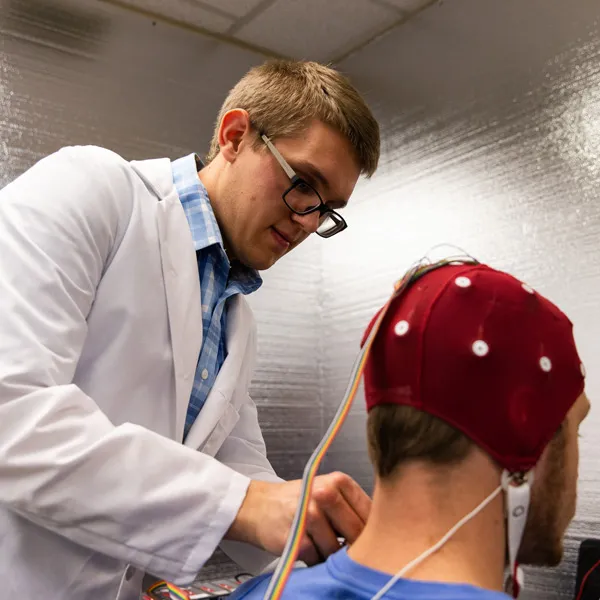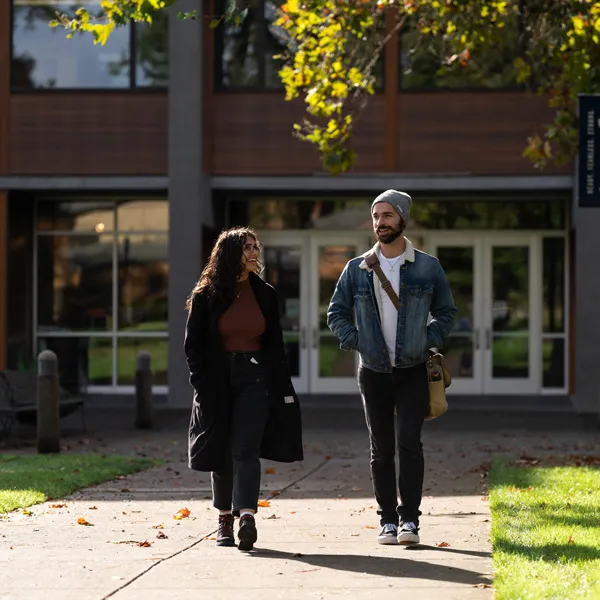How to Become a Psychologist in Oregon
by Carilyn Ellis, PsyD, MSCP
PsyD Program Director at George Fox University

When I was considering going to graduate school for psychology, someone asked me why I was interested in becoming a psychologist. Although I’m not sure I answered exactly this way at the time, I would say now that I chose to pursue this career because I believe that everyone, regardless of what they have done, has the right to an advocate – someone completely on their side. Being a psychologist was a way I could uphold this value in my career.
In graduate school, I learned about the humanistic principle of “unconditional positive regard,” which captures this value. Unconditional positive regard means that the therapist accepts the client, placing no conditions on this acceptance. As a result of being truly loved and accepted for who and where they are in that moment, people are called to become a better version of themselves, and they change.
A psychologist is a formally educated and trained health services professional with a doctoral degree who works in a variety of settings, including research, schools, hospitals, community health agencies, the military, governmental agencies, private practice and more.
The profession has a broad range of opportunities to provide healing to people through direct patient care (including therapy, assessment and diagnosis) and indirect patient care (including research, consultation and education).
To call yourself a psychologist in most states, you need a doctoral degree and a license from a state regulatory agency, which has several requirements for education, clinical training and supervision.
The path to becoming a psychologist is a long one, but like all good things, it’s worth the time and effort; becoming a psychologist can establish a lifelong, exciting and well-paid career. As a psychologist, you can approach healing from every angle: direct patient care, research, assessment, teaching, consulting, etc.
Oregon Psychologist License Requirements
License requirements vary by states, but you’ll have strong portability (the ability to be licensed in multiple states) with a doctoral degree accredited by the American Psychological Association (APA). Some states, such as California and New Jersey, have postdoctoral education requirements (additional courses), but they also offer opportunities to take these classes after you graduate if you want to work as a psychologist there.
Licensure in Oregon is governed by the Oregon Board of Psychologists (OBOP) pursuant to the Oregon Revised Statutes (ORS) Chapter 675.
To become licensed as a psychologist in Oregon, you must do the following:
-
Graduate from an APA or Canadian Psychological Association (CPA) accredited program, including practicum (1,500 hours)
If you have an international degree, your doctoral degree must be reviewed by a board-approved credentialing body.
-
Apply for a license
Submit all forms, references, and application materials, as well as pay a fee.
-
Pass the Examination for Professional Practice in Psychology (EPPP)
The EPP is a national content exam on psychological foundations. It’s developed and managed by the Association of State and Provincial Psychology Boards (ASPPB).
-
Complete a residency (1,500 hours)
A residency is a year of paid, supervised professional practice after you complete your doctorate.
Residencies can be formal, such as those offered by the Association of Psychology Postdoctoral and Internship Centers (APPIC), or they can be informal arrangements with practices or agencies to provide you supervised clinical experience and supervision.
The most important thing to remember with Oregon residency is that you must fully register your postdoctoral fellowship with the Oregon Board of Psychology and receive written approval before you do any clinical practice in Oregon.
If you complete a postdoctoral fellowship in another state, it is absolutely transferable as long as it meets Oregon’s residency requirements, which are detailed in Oregon Administrative Rule (OAR) 858-010-0036: Post-Doctoral Supervised Work Experience.
-
Pass the Oregon Jurisprudence Exam
This is a written exam (most commonly multiple choice) that evaluates your knowledge of the specific rules and laws that govern psychological practice in Oregon. Every state has unique aspects of the profession, so even with the universal knowledge you gain in accredited programs and licensing exams, each state will evaluate your understanding of their specific rules.
Licensure requirements are complex and subject to change as new laws are passed or revised. Please be aware that these requirements may change, and the most accurate and up-to-date information can be found on the Oregon Board of Psychology website.
Education
In most states, you must earn a doctoral degree to become a psychologist, which comes after you have completed a bachelor’s degree. A few states, like West Virginia, license psychologists with only a master’s degree, but it’s important to remember that your professional designation will not be transferable outside of that state. To have the most opportunities as a psychologist, you need a doctoral degree.
Doctoral programs in psychology are about five years long on average: four years of academic coursework and a paid, fifth-year internship that’s often called residency. Once you start, you have up to seven years to complete your doctorate. The American Psychological Association (APA) set this limit to ensure that your training and experience in diagnosis, assessment and treatment are the most up to date and accurate. If you wait too long from start to finish, new information is introduced that you may miss in your training.
The doctoral degrees that have a path to licensure in psychology include:
- Doctor of Philosophy (PhD) in Psychology degree, also known as the Scientist-Practitioner or Boulder Model (after the conference in Boulder, Colorado where its principles were established). The PhD in psychology is the more traditional, research-based degree that includes strong dissertation criteria, research experience and a mix of opportunities, including those with more or less patient care depending on the program.
- Doctor of Psychology (PsyD) degree, also known as the Practitioner-Scholar or Vail Model (after the conference in Vail, Colorado, where its principles were established). The PsyD is focused on developing skilled clinicians with a strong focus on clinical care. PsyD programs also have research as a requirement, which often includes a dissertation. Some PsyD programs allow theoretical papers and other forms of research to meet this requirement.
- Doctor of Education in Psychology (EdD). School psychology is a unique and important area of psychological focus and is specifically oriented to the needs of K-12 school-age children. It includes principles of teaching, assessment, evaluation, diagnosis and therapy related to the psychological issues affecting children and their families. Note: APA considers EdD degrees for accreditation; however as of 2024, there are no APA-accredited EdD programs.
Related Article: PsyD vs. PhD
Some institutions offer an education specialist (EdS) degree in school psychology, which is equivalent to a master’s degree and does not lead to becoming a licensed psychologist. It’s actually a teaching credential that allows school psychologists to practice in schools, but not outside of schools.
Do I need to have a bachelor’s or master’s degree in psychology to apply for a doctorate?
Most doctoral programs in psychology do not require that you have a bachelor’s or master’s degree in psychology. They often require a foundation in psychology, known as prerequisites. For example, some may require you have passed a certain number of courses in psychology, but many do not require your undergraduate major be in psychology.
Unlike other degree paths, a doctorate in psychology is its own terminal degree and does not require a pre-existing master’s degree. In fact, most doctoral programs in psychology have you earn a master’s degree as part of your doctoral program! This is true of George Fox University’s PsyD program.
APA is currently examining accredited master’s degrees in psychology. Although the educational pathways are being built, there are currently few paths to licensure as a psychologist with a master’s degree.
Clinical Training and Research

In all doctoral programs for psychology, you gain practical experience working with people, known as “practicum.” It is one of the best parts of the degree – working with people right away to apply what you are learning, and experience the powerful and amazing healing psychology can provide. APA requires that you complete 1,500 hours of practicum experience throughout your graduate school career, 25% of which must be in direct patient care. This translates to about 375 hours, but the average graduate student gets a lot more during their training.
Once you complete your courses and practicum, you go to a residency in collaboration with the National Match Service (NMS) – which manages multiple medical provider residencies – and the Association of Psychology Postdoctoral and Internship Centers (APPIC). You will go to residency in your last year of training. These are paid positions all over the U.S. and its territories, and Canada, where you do a full year of full-time clinical practice before you have your degree conferred and become an official “doctor.”
APA accreditation requires research as a competency benchmark. How each program chooses to measure this benchmark varies, but the most common requirement is the doctoral dissertation, which is a unique research study designed, implemented and written by you.
Accreditation
The most important factor to consider when you are looking at doctoral programs in psychology is accreditation by the American Psychological Association (APA). APA accreditation is the gold standard for professional psychology education, and many states, employers and government agencies will not consider you for licensure if you don’t graduate from an APA-accredited program.
Accreditation ensures you’re getting quality foundational knowledge to understand your profession, known as Discipline Specific Knowledge (DSK), and that you are being given the right skills to practice as a psychologist, known as Profession-Wide Competencies (PWCs).
APA accredits three specializations in psychology: clinical psychology, counseling psychology and school psychology.
- Clinical psychology: The diagnostic foundations of mental health, treatment, and assessment
- Counseling psychology: Evidence-based practice focusing mainly on treating mental health conditions
- School psychology: Working with kids and families in their educational careers to help them to do their best in school and be happy and healthy in life
Because accreditation provides a solid foundation of psychological knowledge and experience in all specializations, you can trust that you will learn all of the important things you need to know to be a successful professional in all of these degree paths.
What should I look for in a doctoral program besides accreditation?
Even with the universal guidelines of accreditation, doctoral programs range in their approach to education and student development. Every program has a culture, and you should very seriously consider the culture of the program before you join. This will be your full time home for the next four years or more, and it will be instrumental in shaping you as a professional and as a person.
Psychologists, Social Workers and Counselors – Oh My!
The mental health needs of the U.S. and global communities are increasing, so whatever path you choose to become a clinician, welcome and we need you!
Mental health professionals have a broad range of skills and licenses, from certified mentors and peer support to doctoral-level professionals. Each is phenomenally skilled, valuable, and necessary for the health and wellness of the communities we serve. The professions of social work and counseling are phenomenal careers with their own unique competencies and skill sets. I strongly encourage you to look into them, and feel free to check out George’s Fox’s master of social work (MSW) program and two masters in counseling programs.
Related article: Social Worker vs. Counselor vs. Psychologist
A doctorate in psychology allows me to do anything in my career – I can teach at the university level, work in hospitals, start a private practice, do clinical research, perform neuropsychological assessments, consult – and guess what? I am literally doing all of those things right now. I’m even eligible to apply to prescribe psychotropics for the Department of Defense and several states. A doctorate in psychology is a gateway to a never-ending career of thousands of opportunities.
Resources
To learn more about the value and importance of accreditation, visit the APA’s Accreditation Website.
To learn more about the professional competencies, visit the APA Benchmarks System.
To learn more about psychology internships, visit the Association of Psychology Postdoctoral and Internship Centers (APPIC).
To learn more about the Examination for the Professional Practice in Psychology (EPPP), visit the ASPPB website.
To learn more about becoming licensed as a psychologist in Oregon, please visit the Oregon Board of Psychology.
Why Earn Your PsyD at George Fox University?

George Fox’s Doctor of Psychology (PsyD) program in clinical psychology has been APA-accredited since 1998. Nestled in Oregon wine country, we are deeply rooted in Oregon communities and have numerous, strong connections with clinical resources and research opportunities throughout Oregon.
We believe strongly in a culture of community and mentorship, and students have strong relationships with each other and faculty. To quote one of our faculty, “We believe in being different together.”
We believe in high accountability with high support and that the goal of becoming a psychologist is more who you are for the people you serve than what you can do for the people you serve. We accomplish this through traditional academic pursuits, as well as community gatherings, student governance and hours of one-on-one time with students.
In addition to the robust foundation offered by being an APA-accredited program, we offer the unique opportunity to develop a spiritual integration competency. In the George Fox PsyD program, you will expand your cultural and diversity competency to include a rich clinical and personal contextualization of the human experience from spiritual and faith-based lenses.
Although our faculty are exclusively members of the Christian faith, we welcome students from all religious, spiritual and existential backgrounds who want to enhance their self-awareness, clinical conceptualization and clinical skills with religious and spiritual diversity.